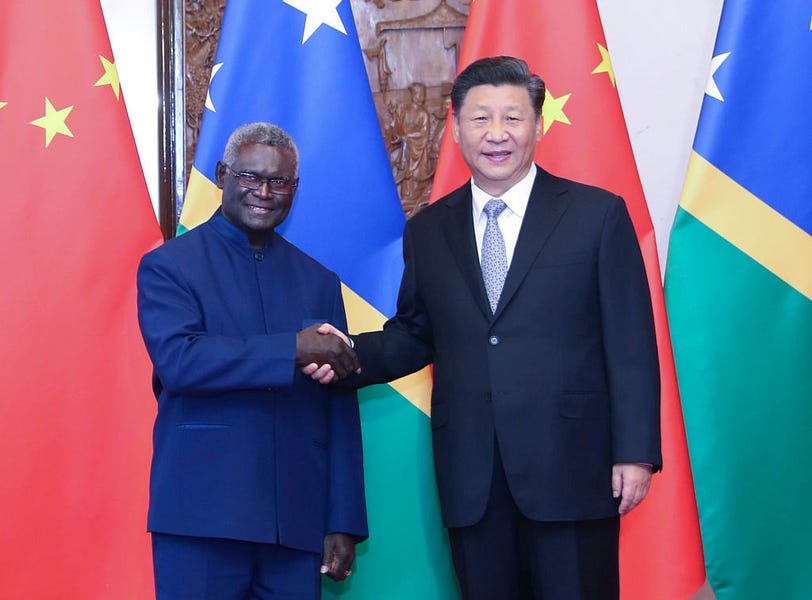In 2010, then-Chinese Foreign Minister Yang Jiechi uttered a now-infamous threat to Southeast Asian nations: “China is a big country and other countries are small countries, and that’s just a fact.” The issue at hand was Beijing’s heavy-handedness in the South China Sea, which would only intensify over the next few years as the People’s Republic of China constructed and militarized artificial islands. Beyond violating its neighbors’ territorial waters, the Chinese Communist Party has also targeted South Korean companies over Seoul’s missile defenses, exploited Sri Lanka’s debt crisis, and pressured Lithuania over its ties with Taiwan.
For its part, the United States has capitalized on the ongoing excesses of China’s foreign policy to cast itself as a trustworthy partner that respects all nations, regardless of stature or power. According to the Biden administration’s own Indo-Pacific Strategy, America’s goal is to help nations make “independent political choices free from coercion.”
But today, in the far-flung corners of the Pacific Ocean, America is failing its own test.
When news broke in late March that China and the Solomon Islands had inked a port-access agreement in the South Pacific, senior Biden administration officials rushed to Honiara, the capital, to convince its leaders to scrap the deal. Daniel Kritenbrink, assistant secretary of state for East Asian and Pacific affairs, walked a thin line between gentle pressure and veiled warnings, saying: “If steps were taken [by China] to establish a de facto permanent military presence … then we would have significant concerns and we would very naturally respond to those concerns.” When journalists asked whether such responses could include military action, Kritenbrink refused to rule it out. Before dismissing that possibility as unlikely, remember that earlier this year then-Australian Prime Minister Scott Morrison called the prospect of a People’s Liberation Army military base in the Solomon Islands a “red line.”
The issue with the administration’s response isn’t its concern with the deal, but its lack of foresight in preventing it. Although the text leaked only two months ago, rumors had been swirling since mid-2021 that a Beijing-Honiara agreement could be in the works. Washington’s haphazard response suggests that America has taken small countries like the Solomon Islands for granted.
Unfortunately, this episode isn’t isolated. In the Northern Pacific, the United States is on the brink of another strategic blunder with the Republic of the Marshall Islands (RMI). The RMI (along with the Federated States of Micronesia and Palau) freely associates with the United States under a compact of free association (COFA) agreement. It is a sovereign nation, but it relies on Washington for substantial economic assistance and government programs. In return, America retains significant defense planning and basing privileges that allow us to project force into the region, blunt Beijing’s advance beyond its near-abroad, and test our missile defense systems and Minuteman III intercontinental ballistic missiles. As it turns out, great powers need “small countries.”
But America’s economic assistance to the RMI is set to expire next year. The U.S. had hoped for an easy renewal, but Majuro wants to expand the agenda to include clean-up of radioactive waste from Cold War-era nuclear tests. The issue may seem mundane to Americans, but it is a vital public health issue for the Marshallese people. After all, America tested 67 nuclear weapons over the Marshall Islands after the end of World War II, displacing hundreds from their homes and creating more than 3 million cubic feet of nuclear waste. Today, RMI political leaders fear that the structure built to contain that waste (Runit Dome) is endangering the groundwater, and have asked to include this issue in the COFA negotiations. Unfortunately, the Biden administration has hidden behind specious legal arguments and avoided the issue. According to some estimates, the damages add up to roughly $3 billion—a hefty price, to be sure. But the cost of inaction could be far higher for the United States, both strategically and reputationally.
In both cases, America’s posture betrays a hypocritical indifference toward the interests of small countries. If the CCP’s “Wolf Warrior” diplomacy and economic coercion are sins of commission, then America’s lack of focus and concern for the needs of Pacific Island nations are sins of omission. A “free and open Indo-Pacific” is more than a rebuke of the CCP’s belligerence; it’s a referendum on America’s trustworthiness as a partner. If we fail to uphold our legal and moral obligations, we risk more than a diplomatic setback. We could potentially open the door to Beijing in a critical region that would undermine our own vital interests. “That is,” in the words of Yang Jiechi, “just a fact.”
Michael Sobolik is a fellow in Indo-Pacific studies at the American Foreign Policy Council in Washington, D.C. This article is adapted from his recent testimony before the House Natural Resources Committee. Follow him on Twitter @michaelsobolik.






Please note that we at The Dispatch hold ourselves, our work, and our commenters to a higher standard than other places on the internet. We welcome comments that foster genuine debate or discussion—including comments critical of us or our work—but responses that include ad hominem attacks on fellow Dispatch members or are intended to stoke fear and anger may be moderated.
With your membership, you only have the ability to comment on The Morning Dispatch articles. Consider upgrading to join the conversation everywhere.